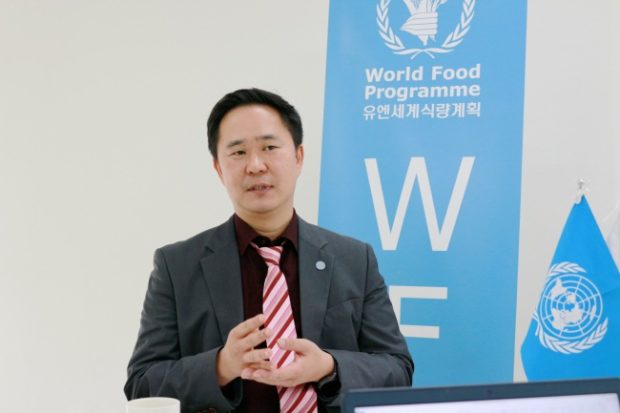
Lim Hyoung-joon, head of the United Nations World Food Program’s Seoul office. (WFP)
With all the negative news about North Korea, the United Nations’ food aid to the country looks set for a donation drought. But Lim Hyoung-joon, the United Nations World Food Program’s Korea office head, stresses humanitarian support must continue, regardless of the communist regime’s nuclear and missile tests.
“The North Korean regime and its citizens are not one entity, which is why the issue should be viewed from a perspective of humanitarian needs,” Lim said in an interview with The Korea Herald on Thursday.
“Political situations can be complicated, but humanitarian aid should be dealt with separately from such conditions,” he added.
The WFP launched the North Korea programme in the mid-1990s, focusing on food and disaster relief. The Seoul office supports its funding and serves as a liaison between the UN body and the South Korean government.
“Our resource is based on voluntary funding and there has been a noticeable drop in donations (following the implementation of UN sanctions against North Korea),” said Lim, expressing worry for next year‘s program.
Despite the lackluster donation figures, however, the UN official expressed hope over South Korea’s plan to provide aid through WFP.
The Moon Jae-in administration will chip in $4.5 million for a nutrition program run by WFP, aimed at nurturing suffering children and pregnant women, for its first state-backed aid to the North.
It comes as part of the government’s $8 million aid package to North Korea, announced in September. The remaining $3.5 million will go to a malnutrition project and vaccine provisions by the UN Children’s Fund. The previous administration under President Park Geun-hye suspended all support to the North following its fourth nuclear weapons test in January last year.
The move has received mixed reactions.
Tokyo warned Seoul to “keep away from actions” that could undermine “international efforts” for regional peace, referring to the UN-led sanctions, adopted after the North’s sixth and largest nuclear test on Sept. 3.
Mindful of the worries, the Moon administration said the time frame of the relief project will be determined in consideration of the overall situation including “the tone of inter-Korean relations.”
Lim said South Korea providing aid to the North at this tense moment will send a positive message.
“WFP provided assistance to Korea after its people were torn from the 1950-53 Korean War. South Korea’s economic development since then is a symbol of hope corresponding with our goal of ‘zero hunger’ in the world.”
“The world will move once South Korea takes a step.”
A recent UN report showed that about 72 per cent of the North Korean population of 24.9 million suffers from food shortages and malnutrition. Among them, 1.3 million, including children and pregnant women, are in dire need of help.
“If unification can be achieved in the future, it’d be nice to see citizens of both nations on equal footing in terms of nutrition,” Lim said.
He also underlined transparency in its aid program.
“We have a very transparent and strict ‘no access, no food assistance’ policy which prioritizes monitoring of our aid supply routes. In the areas we operate, the monitoring team conducts inspections as frequently as 130 times a month,” he stressed.